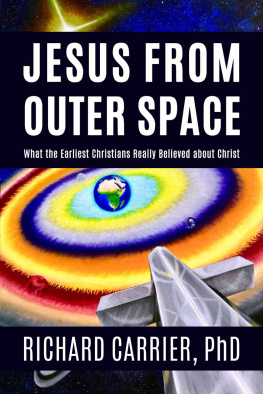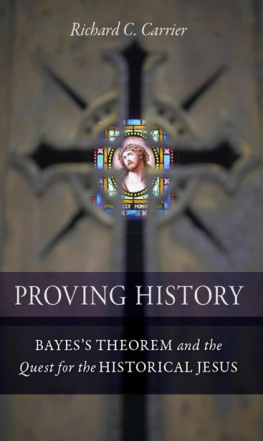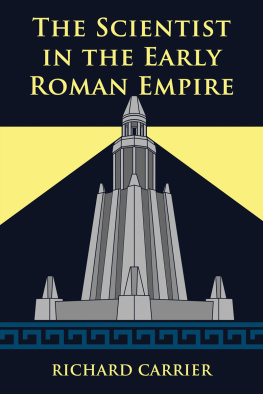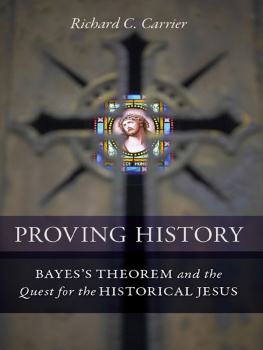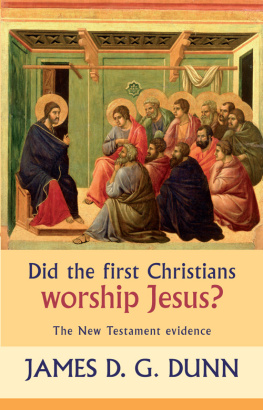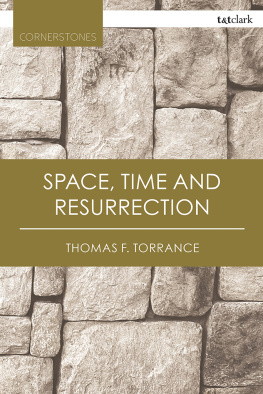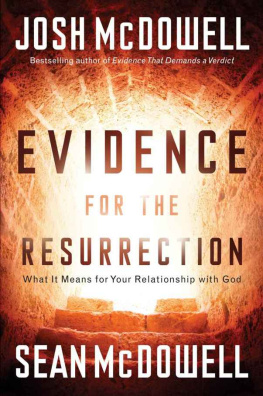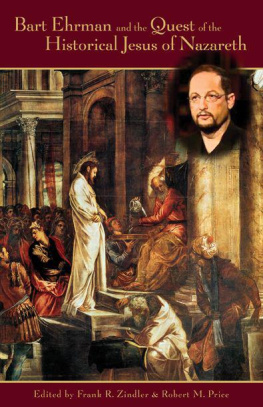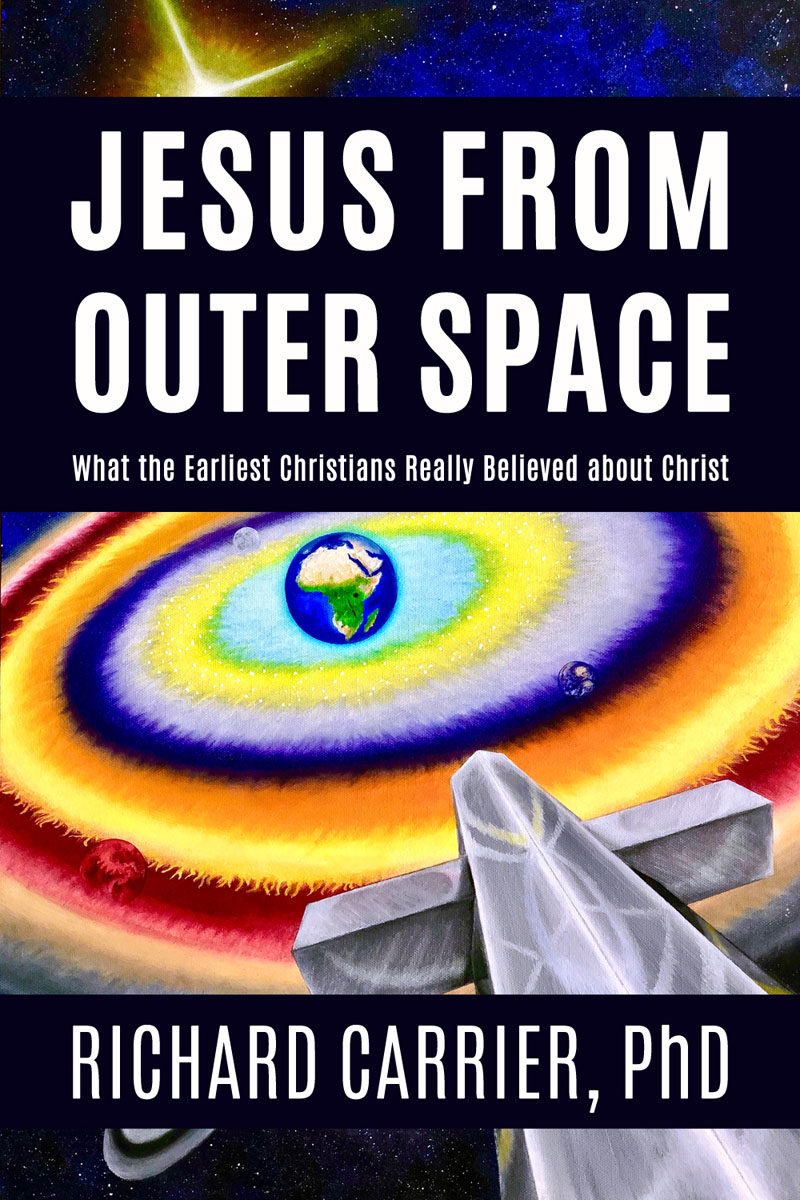

Pitchstone Publishing
Durham, North Carolina
www.pitchstonebooks.com
Copyright 2020 Richard Carrier, PhD
All rights reserved.
Printed in the USA
First edition
10 9 8 7 6 5 4 3 2 1
Library of Congress Cataloging-in-Publication Data
Library of Congress Cataloging-in-Publication Data
Names: Carrier, Richard, 1969-author.
Title: Jesus from outer space : what the earliest Christians really believed about Christ / Richard Carrier, PhD.
Description: Durham, North Carolina : Pitchstone Publishing, 2020. | Includes bibliographical references and index. | Summary: Summarizes for a popular audience the scholarly research on the earliest Christian beliefs about Jesus and argues that modern attempts to conceal, misrepresent, or avoid the actual evidence about these original Christian beliefs call into question the entire field of Jesus studiesProvided by publisher.
Identifiers: LCCN 2020026081 (print) | LCCN 2020026082 (ebook) | ISBN 9781634311946 (hardcover) | ISBN 9781634312080 (ebook)
Subjects: LCSH: Jesus ChristHistory of doctrinesEarly church, ca. 30-600. | Jesus ChristHistoricity.
Classification: LCC BT198 .C325 2020 (print) | LCC BT198 (ebook) | DDC 232.9dc23
LC record available at https://lccn.loc.gov/2020026081
LC ebook record available at https://lccn.loc.gov/2020026082
Contents

Preface

Did Jesus even exist? The idea that he didnt has often been dismissed as something defended only by hacks, cranks, and conspiracy theorists. But it turns out no conspiracy theories are needed. And some evidence for this conclusion really does hold up. Indeed, many experts are now starting to question the historicity of Jesus. Because when you clear away all thats ridiculous about this claim (and much indeed has been ridiculous), there remains enough evidence to genuinely suspect that maybe, just maybe, Jesus didnt exist after all.
Of course, all mainstream experts agree the Gospel Jesus is mythical. Only fanatics and fundamentalists think otherwise. But the mainstream consensus still holds that there must have been some real man buried underneath all that legend and mythology. Yet, the consensus ends there: these same experts promote countless contradictory theories about who Jesus was and what he taught or did. But in 2014, for the first time in nearly a century, an alternative theory that proposed Jesus likely never existed at all passed peer review at a mainstream biblical studies press, Sheffield-Phoenix. That book, written by the very author of the book you are now reading, was titled On the Historicity of Jesus, and was written after I received my Ph.D. in ancient history from Columbia University and then completed my own grant-funded postdoc research study. Though that book was met with irrational hostility by many experts who fear the consequences of its thesis, others are entertaining the possibility that that thesis, or something like it, might be right.
Key to all this is a fact not often known to the public: that the earliest Christians taught Jesus came from outer space. Not in a fully modern sense, but in an ancient sense. By the time of Christianity, Judaism had long incorporated what was then modern science, which taught that multiple spheres of heaven physically surrounded the earth, with a spherical earth at the center, and that those heavenly realms were held up not by pillars as in more ancient teachings, but by gaseous or ether-filled spaces, extending all the way to the moon and beyond. All of that encompassed what we today mean by outer space. So the most accurate English translation of words that meant the heavens in antiquity is quite simply outer space.
Of course, the ancient people of Judea didnt believe in an extraterrestrial vacuum (some then did, just not Jewish theologians). But thats not what even we mean by outer space. We mean everything above Earths atmosphere, all the space out there. And thats what they believed too. Many imagined a thinner kind of material occupied the remainder of the universe, whether some kind of invisible fire or ether, notions we wouldnt even abandon ourselves until the end the nineteenth century. And they imagined creatures of various kinds lived in every level thereofwhich we would call space aliens today. Which only means they had different beliefs than we do about what exactly was in outer space. But they certainly had the same conception we do of what was outer space. So we ought to refer to their ideas just as they would have understood them, and not obscure their beliefs behind inaccuracies. The modern idea of heaven is of an other-dimensional space that has no physical location inside our universeand that idea bears no resemblance at all to what they believed back then. So heaven is an inaccurate and indeed misleading translation today. Outer space is much closer to what their real beliefs were. And this is exactly the point of this books title: when we translate the words of the earliest Christians to better reflect what they were actually saying, things look very different than you might have assumed.
What does this all mean? The most accurate description of earliest Christian thought is that Jesus was an angelic extraterrestrial, who descended from outer space to become a man, teach the gospel, suffer an atoning death, and rise again to return to his throne among the stars, even more powerful than before. On these facts most leading scholars agree. But what if, in fact, Jesus was originally thought to have resided only in outer space? To never have visited Earth at all? What if even his incarnation and death were celestial events? We all agree the Christians originally believed Jesus was from outer space. So the only question is, in the original creed, how far did they think he actually descended from there to effect his cosmic sacrifice? A good case can be made that Christians originally thought Jesus descended only as far as Satans realms in the sublunar sky, and the notion that Jesus went all the way down to Earth to live and preach there was invented a lifetime later.
The complete, sober, academic case for this conclusion, with all the requisite evidence, cited scholarship, footnotes, and apparatus, you will find in the near seven-hundred pages of On the Historicity of Jesus. Here in your hands is a much briefer, more colloquial, but still informative summary of that more serious academic monograph, a concordance to which youll find at the end of this book. Ive also written on the problems of methodology plaguing Jesus studies in my other peer-reviewed book Proving History. I also reproduced all my peer-reviewed research articles on the subject in my book Hitler Homer Bible Christ, up to the year 2014. And I continue to write on this subject and respond to critics through my website at richardcarrier.info. But in the book you are now reading youll get a look at all the actual evidence that exists for a historical Jesus, as well as all the evidence that astonishingly doesnt. Youll also see the best reasons why his existence is indeed worth doubting, and all the surviving clues pointing to there having been Christians who once thought the earthbound Jesus was a useful myth, and to the conclusion that theirs may have been the original view. But their writings, almost entirely, and certainly as originally written, are all lost. All we have now are what much later Christians chose to preserve or fabricate.
Next page
